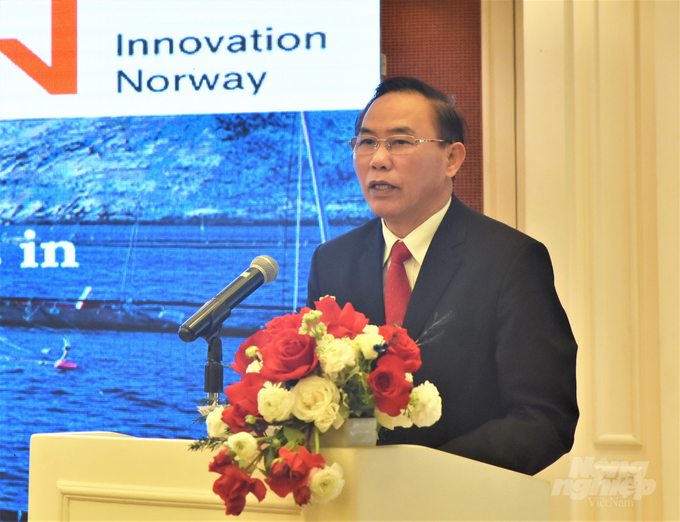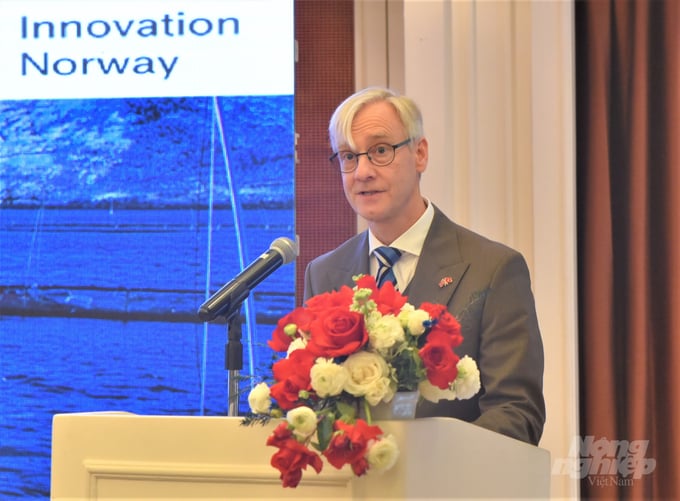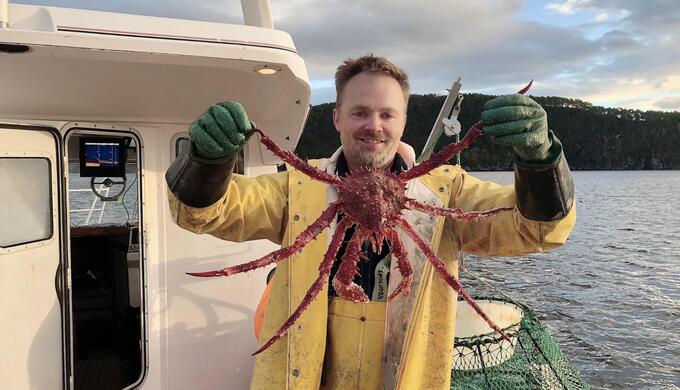May 19, 2025 | 22:38 GMT +7
May 19, 2025 | 22:38 GMT +7
Hotline: 0913.378.918
May 19, 2025 | 22:38 GMT +7
Hotline: 0913.378.918

Deputy Minister Phung Duc Tien highly appreciated Norway's support for the Ministry of Agriculture and Rural Development, especially in the fisheries sector. Photo: Pham Hieu.
On February 28, the Norwegian Embassy in Hanoi and the Ministry of Agriculture and Rural Development (MARD) jointly organized the workshop "Vietnam - Norway: Opportunities for cooperation in aquaculture and fishery export”. The event occurred on the occasion of the official visit to Vietnam of Mr. Erling Rimestad, the Norwegian Ministry of Foreign Affairs' Secretary of State.
The workshop aims to further strengthen bilateral cooperation between Norway and Vietnam in the fisheries sector. It also serves as a forum for the authorities, businesses and related parties of the two countries to exchange information, learn from each other, promote practical solutions to better cooperate. The workshop is a place where new opportunities are born, especially considering the trend of greener and more sustainable development worldwide in which science and technology solutions play a crucial role.
Visiting Vietnam for the first time, Secretary of State Erling Rimestad highly regarded the bilateral relationship between the two countries in many fields, particularly the effective coordination in the fisheries sector. “Norway and Vietnam share an interest in the equitable and sustainable development of the fishery industry in the context of increasing global challenges especially climate change. Technological innovation will play an important role to secure success and open up new opportunities in the two countries’ traditional cooperation,” said Mr. Erling Rimestad.

Secretary of State Erling Rimestad highly regarded the bilateral relationship between the two countries in many fields, particularly the effective coordination in the fisheries sector. Photo: Pham Hieu.
Speaking at the workshop, Deputy Minister of Agriculture and Rural Development Phung Duc Tien expressed appreciation towards Norway's support for the MARD specifically the fisheries sector over the past 30 years, from legal framework construction to technical support, training and capacity development.
Riding the flow of market opening and global integration, Vietnam's fishery industry is entering a new stage of development on the foundation of outstanding achievements gained during the previous periods. Along with proactively removing difficulties and challenges, Vietnam encourages the application of advanced science and technology to production, associating production activities with environmental protection and raw material production with processing, promoting trade, expanding the export market. Effective and sustainable development of the fishery industry is one of Vietnam’s key orientations in the coming decades.

Norway and Vietnam share a common interest in the equitable and sustainable development of the fishery industry in face of the heightening global challenges. Photo: nytimes.com.
“The workshop is an opportunity for Vietnam and Norway to deepen bilateral relations in the field of industrial mariculture and to promote seafood trade, realizing the fields of cooperation stated in the Letter of Intent that the two sides signed in May 2021," said Deputy Minister Phung Duc Tien.
According to Ms. Hilde Solbakken, Norwegian Ambassador to Vietnam, Norway is proud of its cooperative relationship with Vietnam in the fields of fisheries, aquaculture, and maritime. This is considered one of the focuses since the two countries’ establishment of diplomatic relations in 1971.

The core of the Norwegian aquaculture industry was a combination of traditional knowledge and modern science, with environmental protection considered an important criterion. Photo: Arctic Seafood Norway.
Mr. Asbjørn Warvik Rørtveit, Asia Pacific Regional Director, Norwegian Seafood Council, said that the core of the Norwegian aquaculture industry was a combination of traditional knowledge and modern science, with environmental protection considered as an important criterion.
“In 2023 the Norwegian Seafood Council will strengthen trade promotion activities in Vietnam. Any Vietnamese importer can register to use the trademark 'Seafood from Norway' for their products," said Mr. Asbjørn Warvik Rørtveit.
Norway is a country with the world's pioneering fishing and aquaculture industry. Its core value lies in sustainable development, environmental protection while constantly improving the economic value and reputation of the country’s national seafood on the world market. On the other hand, Vietnam holds great potential for sustainable and responsible aquaculture development. Norway has many meaningful lessons across the industry value chain to share with Vietnam and help Vietnam operate aquaculture activities more sustainably and with lower carbon emissions.
Translated by Samuel Pham
![Reducing emissions from rice fields: [Part 1] Farming clean rice together](https://t.ex-cdn.com/nongnghiepmoitruong.vn/608w/files/news/2025/05/05/z6509661417740_a647202949c539012a959e841c03e1d3-nongnghiep-143611.jpg)
(VAN) Growing clean rice helps reduce environmental pollution while increasing income, allowing farmers to feel secure in production and remain committed to their fields for the long term.
/2025/05/19/5136-1-144800_230.jpg)
(VAN) The Nghe An Provincial People's Committee has just approved the list of beneficiaries eligible for revenue from the Emission Reductions Payment Agreement (ERPA) in the North Central region for the year 2025.

(VAN) 14 out of 35 domesticated elephants in Dak Lak province have had their living conditions improved, with 11 of them currently participating in the non-riding elephant tourism model.

(VAN) Muong Nhe Nature Reserve hopes that being upgraded to a national park will lay the foundation for forest protection efforts to be carried out in a systematic, modern, and sustainable manner.
/2025/05/16/3923-2-171845_52.jpg)
(VAN) Lower costs, higher yields, and improved soil quality are outstanding benefits that soybeans bring when integrated into the crop rotation system.

(VAN) The 'For a Green National Environment' programme aims to promote a green lifestyle, support businesses in implementing ESG practices, and turn Net Zero commitments into concrete actions.

(VAN) Cold-barn systems efficiently manage environmental and temperature conditions, which aids in the prevention of respiratory diseases in pigs and protects them from the vectors that transmit African swine fevers.